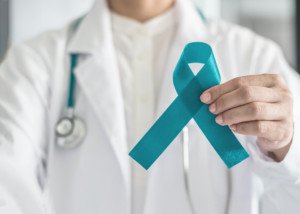
Can you name 10 symptoms that can mean gynecological cancer?
Some will surprise you — signs that most women mistake for a benign condition. This can cost them their life.
“The most common types of gynecologic cancers, or diseases of the reproductive organs, are uterine, ovarian and cervical,” says Karen Patrusky, a board certified OBGYN and F.A.C.O.G. in private practice for 20+ years.
Women even in their 20s can get these cancers.
The University of Texas MD Anderson Cancer Center has compiled a list of symptoms that can mean a gynecological cancer.
It’s common for women to mistake these signs for a benign condition.
It’s also common for women to believe they’re too young to have uterine or ovarian cancer, and in fact, it’s not uncommon for a physician to put cancer at the bottom of the list of possibilities due to the patient’s young age.
10 Signs of Gynecological Cancer that Most Women Think Have a Benign Cause
1 Frequent Bathroom Breaks

©Lorra Garrick
Throughout the day, a woman may have a more frequent than usual need to urinate — that is not related to large urine volume.
She often really “has to go,” but then very little actually comes out.
Even after voiding, it may still feel like her bladder is full.
This sign can mean ovarian (or bladder) cancer.
2 Back Pain

Freepik.com shayne_ch13
Many benign conditions can cause back pain. In fact, the vast majority of back pain has a non-malignant cause.
And even when a woman suspects cancer, her mind tends towards a spinal tumor rather than ovarian cancer.
3 Increasing Belly Size

Paulus Rusyanto /reamstime.com
Most women, especially older, will mistake this symptom of ovarian cancer to fat gain.
With the “fat acceptance” agenda becoming more pronounced these days, some women will be inclined to shrug off what they think is more belly fat — when in fact, it’s ascites (abdominal fluid buildup) from ovarian cancer.
This is why it’s dangerous to just blow off weight gain in the name of body positivity.
Ovarian cancer “is a deleterious condition because symptoms typically don’t present until the disease is advanced,” says Dr. Patrusky.
“These symptoms include early satiety, abdominal bloating and distention, and abdominal and pelvic pressure and pain.”
4 Unexplained Weight Loss

Freepik.com
On the other hand, unexplained weight loss should never be a cause for elation.
Though some women may suspect diabetes (which is smart to do), they should also have gynecological cancer on their radar.
In fact, many other cancers can cause unexplained weight loss, which in this case tends to be rapid.
5 Suppressed Appetite

Shutterstock, piramidonforte
This will be welcome to women trying to lose weight.
It may also be overlooked in a very busy or stressed woman.
And it’s not just about not feeling hungry lately, but also about feeling full after eating small amounts of food.
This can mean the ascites from ovarian cancer.
6 Ongoing Fatigue

Shutterstoci/Miss Ty
This can be mistaken for “getting old,” menopause, stress from a new job or quitting an exercise regimen.
Though unexplained fatigue can also be caused by anemia, diabetes and many other conditions, any gynecological cancer can cause it.
7 GI-type Symptoms

Shutterstock/Emily frost
Have you been feeling nauseous lately? Having a lot of gas and other issues that seem to be GI related? See a gynecologist before you see a gastroenterologist.
GI or “stomach issues” don’t always mean cancer, but if they last for more than two weeks, see your doctor, especially if you’re postmenopausal.
8 One Leg Is Swollen

Shutterstock/GBALLGIGGSPHOTO
“Symmetric swelling in the legs is due to fluid retention and this can be caused by numerous conditions relating to heart, kidney, liver, metabolic and vascular conditions,” says Dr. Patrusky.
“Unilateral leg swelling and/or pain can also be a warning sign of disease and must be evaluated.
“Although advanced cervical cancer is not the only cause of this condition, it can cause unilateral swelling due to lymphedema from cancer spread to the nodes in the area around the hip.
“This results in fluid accumulation in the lower extremity.”
If you notice one leg is swollen, this means a trip to the ER, because it can also mean a dangerous blood clot.
If you have a swollen leg but no other symptoms pertaining to the pelvic area, it’s probably not cervical cancer.
However, one swollen leg for no apparent reason is an alarming symptom not to ignore.
9 Abnormal Vaginal Discharge

Shutterstock/sasha2109
“Uterine cancer is an abnormality of the lining, the endometrium, and presents with irregular bleeding in a woman who is before menopause, and postmenopausal bleeding in a woman who has not had a period in over a year,” says Dr. Patrusky.
Vaginal discharge from uterine, cervical or vaginal cancer doesn’t always contain visible blood. It can be white, yellowish or clear, and thick or thin.
Though abnormal discharge, with or without blood, is more likely to have a benign cause, it needs to be promptly checked out.
10 Pelvic or Abdominal Pain

Shutterstock/fizkes
The pain may be in the form of cramps, pressure or heaviness. There are numerous benign causes such as colitis, prolapsed bladder or vagina, uterine fibroids, a pulled muscle and an ovarian cyst.
But uterine, ovarian and cervical cancer, too, can cause discomfort in the pelvic or lower abdominal region.
When to See a Doctor
- Symptoms have no explanation and are new in onset.
- Symptoms have persisted for longer than two weeks.
- And especially if there’s more than one symptom.
- Family history of gynecological cancer.
- Other high risk factors such as smoking, obesity and unprotected sex especially with multiple partners.










































